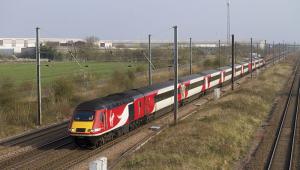Labour would keep the East Coast rail franchise in government hands to provide a ‘public sector comparator’ with private train operators, shadow transport secretary Maria Eagle has revealed.
Speaking to the party’s annual conference yesterday, Eagle said state-owned Directly Operated Railways had ‘picked up the pieces’ after previous operator National Express had to halt operations on the line in November 2009. The firm was unable to meet the franchise payments it had agreed to pay the government in the East Coast deal.
This was the second failure in less than three years after previous operator GNER also had to give up the line in 2007 when its parent company ran into financial difficulty.
Eagle told Labour delegates that keeping the line in public hands had returned £187m to the government this year, up from £170m the year before.
She added: ‘So if we were in government today, we’d provide long-term certainty and stability on the East Coast line. Not privatisation for its own sake, but a real public sector comparator.’ Such a firm could provide a comparison to franchise bids from other firms, such as the recent deal signed by the government to award the West Coast mainline to FirstGroup.
Eagle also urged the government to make it easier for local authorities to agree ‘quality contracts’ with bus firms, which could give councils and Integrated Transport Authorities more control over bus services.
Powers to introduce the deals, which can specify routes and timetables for bus firms, already exist but they have to be approved by a Quality Contract Schemes Board before they are agreed, and are not often used.
Eagle admitted that introducing these deals ‘remains difficult in practice’ and urged ministers to ‘work with councils, not against them’ to make it easier for authorities to have greater control over services.
Meanwhile, shadow energy and climate change secretary Caroline Flint told the conference that energy regulator Ofgem would be scrapped by an incoming Labour government.
She said the body needed to be replaced with a ‘tough new regulator’ with the power to force energy firms to pass on reductions in the wholesale price of gas and electricity, to restore people's trust in the energy market.
‘Whenever bills go up, the energy companies always tell us they’re only passing on their costs. So why, when prices rise, do bills go up like a rocket, but when they come down they fall like a feather – if at all,’ said Flint.
‘The reason is they’re allowed to run their businesses in such a complicated way that it’s almost impossible to know what the true cost of energy is. This must end.’
She said Ofgem, which has regulated the energy market since privatisation in 1986, had ‘too often... ducked the opportunity to get tough with the energy giants, failed to enforce its own rules and let energy companies get away with ripping off hard-pressed families and pensioners’.
A new regulator would be able to ‘open up the books of the energy giants’, she added. ‘If they don’t do it first, we will force the energy companies to pass on price cuts.’





















